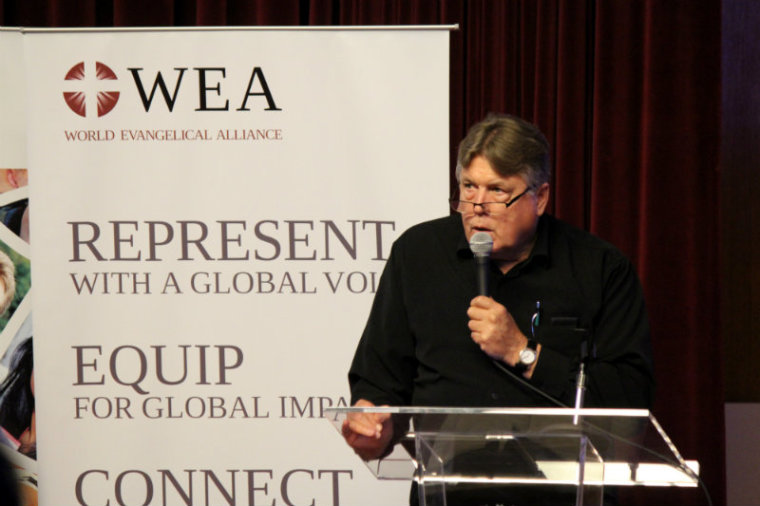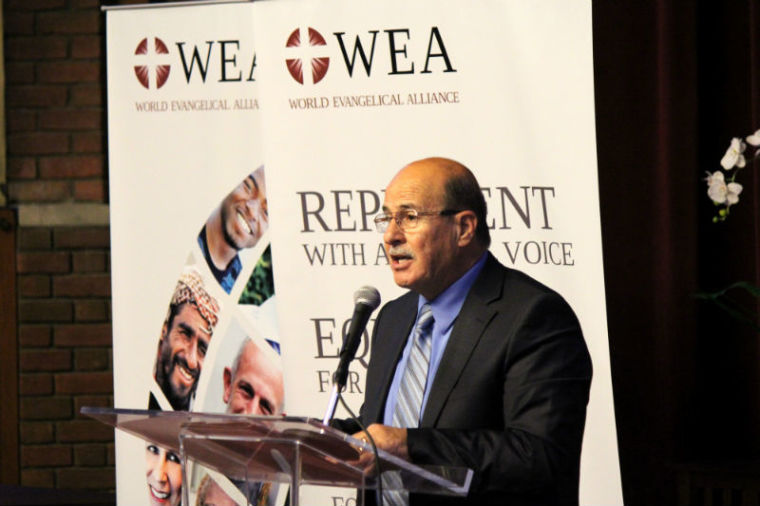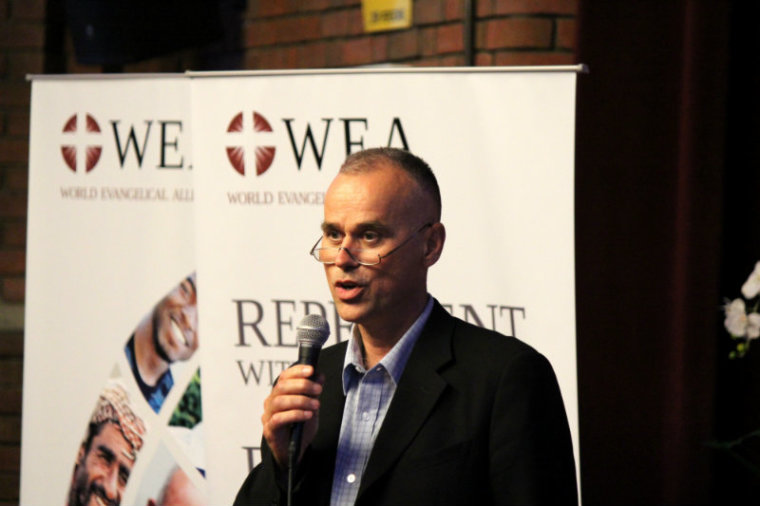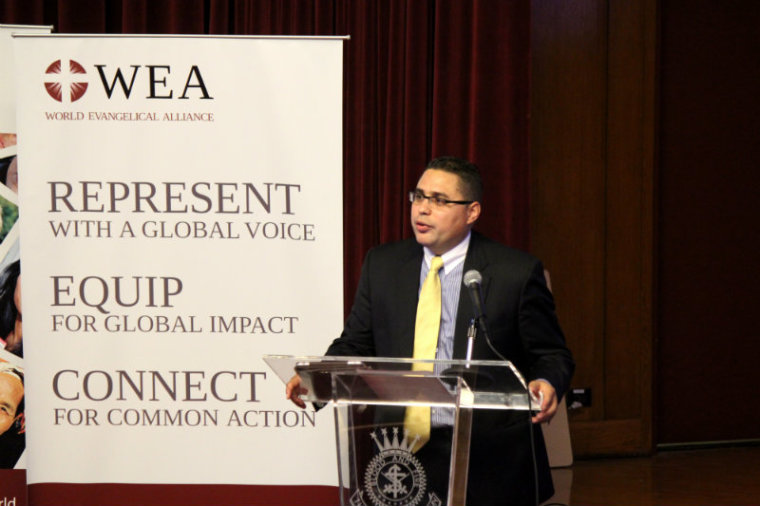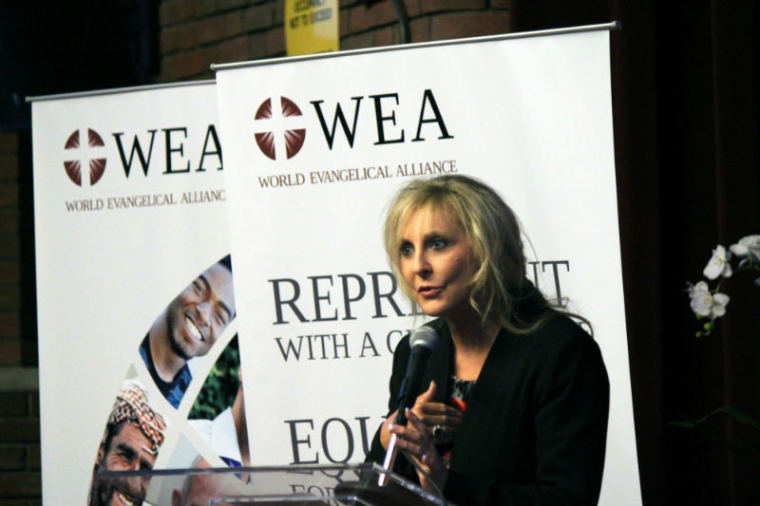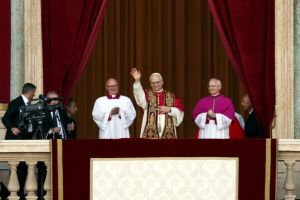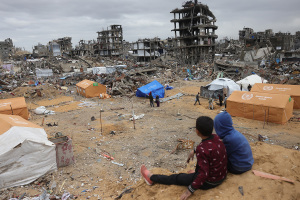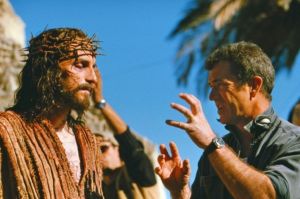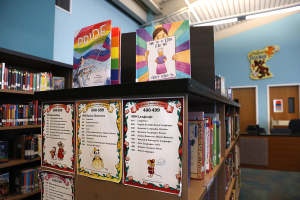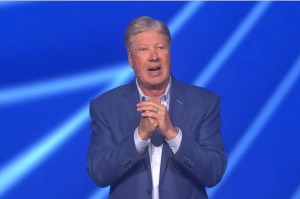Evangelical Christian Pastor Says Jews Were Chosen by God to Serve; Not to Be 'Teacher's Pet'
Leader of Diverse Faith Community in Israel Prays for Reconciliation at WEA's Special Mideast Service
NEW YORK — An American pastor of a diverse congregation in Israel known to be targeted by anti-Christian vandals, reminded those in attendance at a recent Mideast prayer service that, according to the Bible, the Jewish people were chosen by God in special service to the world, and never designated as "the teacher's pet." He also called for Christians to be careful in jumping to judgement and picking sides in the long-standing Israeli-Palestinian conflict.
The Rev. Charles M. Kopp, pastor of the Baptist Narkis Street Congregation, a 100-member Christian church in West Jerusalem, made the remarks last Thursday evening at a World Evangelical Alliance prayer meeting at the Salvation Army International Social Justice Commission in New York City.
The occasion of the prayer meeting was "A Call to Prayer for the Middle East," with additional remarks made by the Rev. Gabriel Salguero, President of National Latino Evangelical Coalition; Dr. Munir Kakish, Chairman of the Council of Evangelical Churches in the Holy Land (representing Evangelicals in Palestinian Territories); and the Rev. Harry Tees, WEA Ambassador to the Holy Land. During the prayer meeting, opened by WEA United Nations Permanent Representative Deborah Fikes, mention was made of conflicts raging in Syria and Iraq, as well as in other countries in the Middle East.
But it was the most recent 30-day war between Israel and Gaza that, naturally, was the focus of remarks made by the Rev. Kopp, who in addition to pastoring a church, is the chairman of the Evangelical Alliance of Israel. Kopp was born in Los Angeles, California, and has been living in Israel for 48 years. He has been leading the Baptist Narkis Street Congregation for 22 years.
"Remembering that part of the world is so crucial to world peace," Kopp told the dozen or so people in attendance at the prayer service. "It's at the crossroads of continents. In and of itself it's insignificant, significant territory — it doesn't have the oil like the rest of the Middle East. It doesn't have … reservoirs of minerals [and] precious metals, but it's at the crossroads of the 10/40 Window. … You have Israel located at the very heart of the 10/40 Window." The 10/40 Window includes areas of the world with the largest population of non-Christians.
"It's been a bone in the throat of the Islamic world," added Kopp, noting that he has lived among Muslims, among Jews, and "lived on both sides of the political equation, and enjoy both peoples equally."
"But it's good to have a little background to understand what we're dealing with, the crux of the problem," he said.
"Islam, the mandate that they have is to recover all land that was once ruled by them, and Israel was Islamic land for centuries. … But you may think the question next to be answered is: 'What is our relationship with the Jewish people? Are they still chosen today? Do they have a special function in God's economy?' I think that it also needs to be answered," said Kopp.
"One thing that helped me was to consider the 'chosenness' question," he added. "The Jews were not chosen to lord it over the rest of the world. They were assigned to have a special position in God's economy, but they were chosen to serve."
In regard to their belief the Jewish people were "chosen" by God, Christians generally point to Old Testament passages like Deuteronomy 7:6, which reads: "For you are a people holy to the Lord your God. The Lord your God has chosen you out of all the peoples on the face of the earth to be his people, his treasured possession." In their distinctive relationship with God, the ancient Israelites, according to Christian interpretation of passages like Isaiah 43:10-13, were to be witnesses to the world of His existence.
"In God's economy, they were never intended to be the teacher's pet, but they were chosen to serve..." said Kopp. "They've given us the Holy Scriptures, they gave us the prophets, they gave us the apostles, through Christ they gave us the messiah."
"So the Church asks this question: 'how much of a part do they have to play in our day-to-day in 2014? Is there still a place for them?'" he asked.
After stating that "God will have to settle that question in your hearts," Kopp insisted that it was not his place to deal with that question. "But God will work things out in His way and His time," he added.
The pastor and EAI chairman cautioned attendees "to be careful not to jump into judgement and condemn either side," referencing the long-standing Israeli-Palestinian conflict.
"The Arabs are the most hospitable people in the world bar none," he added. "You can go [into an] Arab neighborhood and they will welcome you into their home to eat, to drink, to stay with them. And the Israelis have another culture. They are hard to get to know. It's been said, they're like the prickly pear (or a sabra, slang for native Israeli Jews) — prickly on the outside but sweet on the inside once you get to know them. So each have their unique positive points and negative points, but God has called us to love both sides."
Kopp begged attendees to "not be swayed by the media because the media lives on soundbites and slogans."
"And they want quick answers," he added. "They want to call international tribunals about war crimes. They want to wrap up the situation tidily and move on to the next issue, but this issue in the Middle East is not going to go away with one sweep of a magic wand, so we have a situation where we can be peacemakers if we'll get to know God's heart for the situation. That is to love people irregardless of their background."
Sharing about his congregation in Israel, which includes Jews, Arabs, and other ethnic groups, Kopp stated that everyone is encouraged "to get to know Palestinians on a first name basis, make real friendships with Palestinians." They are also encouraged to get to know their Jewish neighbors personally.
"Go to their homes, eat their foods. Or you invite them to eat your food. [In] that way to break down any stereotype that you might have, any prejudices that you might have for either side and just to hear the thing in their heart, the things that make them rejoice, the things that make them laugh and the things that make them happy. Get to know them, all peoples."
In his closing prayer, Kopp called on God as the "Father of Abraham, Isaac and Jacob" and referred to Him as "God of the Palestinians. God of the Jews." The Christian minister prayed that God would "reach down and move on the hearts" of military leaders, politicians and everyday people. He asked that God would bring His order and the lasting peace that He "wants and desires for that region."
Kopp has previously stated that it was "imperative" for Christians to "remember that our first allegiance and citizenship is from above and that we cannot use the Bible selectively to defend the cause with which we identify."











